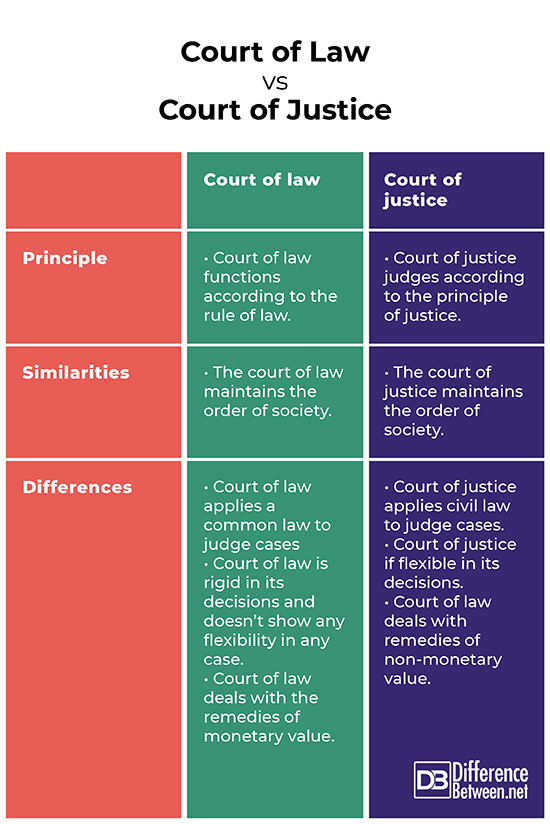Difference Between Court of Law and Court of Justice
What is Court of Law?
Definition:
Court of law is the legal body having authority to judge civil, military, criminal, ecclesiastical disputes between different groups in the society in accordance with the rule of law. In the 9th century, after the English were invaded by British, English royal judges holding the King’s court established a legal body which was later named as Court of law or common law court.
Characteristics:
- It judges cases by applying common law.
- In a court of justice, every person is held accountable for his actions equally. Rule of law prevails, and no one can escape that.
- In a court of law, the jury is independent of influences from state and other authorities and can take decisions independently based on laws.
- In courts applying common law, the accused is considered innocent until proven guilty by providing legal proofs against him.
- According to its doctrine law holds the supreme power and authority no one can question the supremacy of law.
- It is common in legal systems of England and America.

Example:
Consider a case in which a person gets his furniture polished by a carpenter. After the carpenter is being done with his work, the person refuses to pay him. According to the court of law, he is bound to pay him the amount they initially decided, or the person can be punished in the offense of deceiving.

What is Court of Justice?
Definition:
Court of justice is defined as an authority that hears the appeals of cases that are not justified by law and demand an equitable and just decision. These courts emerged when the petitions were made in front of Lord Chancellor of England against cases judged by the court of law applying common law.
Characteristics:
- It applies the principles of civil law. Thus, it is involved in protecting the civil rights of people.
- It deals with the cases of equitable and just remedies when a legal remedy is not justified.
- It holds a higher office or authority as it deals with cases that fail to gain the trust of parties through its decision.
- It takes decisions based on the conditions of people rather than following a fixed written doctrine.
- Court of justice gains all the power and authority from the principle of justice.
- Court of justice has the power to rectify or give remedy in cases defective in common law in matters such as legal execution, a natural duty of benevolence, protection of individuals from self-harm, etc.
Example:
In the case of the court of justice, the judges have the authority to make a decision according to their discretion based on the social circumstances. This decision is based not on the written doctrine of law but according to the burden of proof.
Similarities between the Court of Law and Court of Justice:
- Both courts of law and justice operate to protect the rights of individuals of society such that law and justice prevails.
Difference between the Court of Law and Court of Justice:
Historical perspective:
The history of the court of law dates back to the 9th century when King’s court established a body for legal matters and developed a system of justice common to all regardless of circumstances and social conditions. While the concept of a court of justice came later when petitions were made before Lord Chancellor of England in the 16th century.
The relief requested from the lawsuit:
The difference between cases forwarded to the court of law and court of justice is basically because of the relief asked from them. In case of the relief asked from the court of justice, a person asks for non-monetary relief. It can be a writ, an injunction or a legal order that can relieve a person from certain harm. It also deals with cases involving contracts such as its performance or its modification. On the other hand, reliefs requested from the court of law involves legal decisions that involve monetary reliefs and decisions based on the law and are not susceptible to modifications.
Fairness:
Court of law takes decisions according to the law that is not bound to change with the change in circumstances. Judging cases in black and white leaves out room for injustice in some situations. While the court of justice makes up for the injustice caused by the court of law by judging cases viewing them as a grey area. In the court of law, justice prevails, and cases are judged according to social circumstances fairly.
Criteria of judgment:
Court of law is bound to judge according to the black letter rules while the court of justice is not bound to follow any fixed criterion of judgment.
Nature of orders:
Court of law has the authority to order writs but the court of justice orders injunctions and rescission.
Hearing of cases:
In a court of justice, the judge is responsible for hearing the cases and settling the matter while in a court of law hearing of cases is handled by the judge and the jury.
Court of Law Vs Court of Justice:

Summary of Court of Law Vs Court of Justice:
The court of law and court of justice both are the authorities that deal with hearing of disputes and settle matters among masses to bring law and order in society. Court of law emerged after the formation of common law by King’s court in England which judged cases based on a common law code. Later in the 12th and 13th century, people started filing petitions against it and hence court of justice was formed. In the court of law general rules are being made and it leads to certainty while the court of justice acts to keep checks and balances on the decisions of a court of law so that justice prevails.
- Difference Between Court of Law and Court of Justice - August 10, 2019
- Difference Between Labor Day and Memorial Day - July 28, 2019
- Difference Between Whistleblower and Leaker - July 27, 2019
Search DifferenceBetween.net :
1 Comment
Leave a Response
References :
[0]Image credit: https://pixabay.com/de/illustrations/gesetz-gericht-rechtsanwalt-3949481/
[1]Image credit: https://pixabay.com/de/photos/die-k%C3%B6nigliche-gerichtsh%C3%B6fe-london-1648944/
[2]"The Differences Between Common Law and Equitable." LawTeacher. LawTeacher.net, November 2013. Web. 31 May 2019.
[3]Homes, Henry, and Lord Kames. “Online Library of Liberty.” Principles of Equity - Online Library of Liberty, 2014, oll.libertyfund.org/titles/kames-principles-of-equity.

The author has missed the point that under Common Law, the judge is merely a convenor and barristers are not required. The Jury is the judge both of the case and of the law pertaining to it. The Jury decision on the case must be unanimous – majority decisions are inapplicable – or else the case must be dismissed. If the law is found to be unjust then the Jury is authorised to Nullify the Law on the grounds of an unjust or unfair law being no law at all.